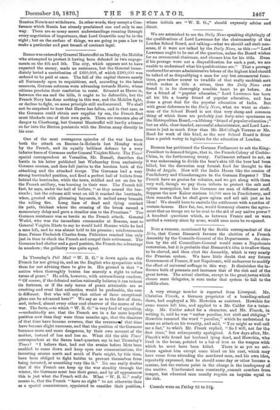In Thursday's Pall Mall "W W . R. G." is down
again on the French for not giving in, and on the English who sympathize with them for not advising them to give in. His ground is that " a nation when thoroughly beaten has scarcely a right to refuse terms of peace." He adds, however, with extraordinary candour, 4g Of course, if the defeated nation rationally believes it can redeem its fortunes, or if the only terms of peace attainable are so crushing and cruel that extinction would be preferable, the case is different. But who will say that either of these exceptional .pleas can be advanced here?" We say so as to the first of them, and, indeed, almost every other cool observer of the course of the war. The facts,—to which " W. R. G." is very fond of appealing, —undoubtedly are, that the French are in a far more hopeful position now than they were three months ago, that the disasters ef that time have become reverses, that the reversesof that time have become slight successes, and that the position of the Germans becomes more and more dangerous, by their own account of the matter, instead of less and less so. What did the able Times' 'correspondent at the Saxon head-quarters say in last Thursday's Times? "I believe that, had not the armies before Metz been enabled to come down and keep open our communications, the investing armies north and south of Paris might, by this time, have been obliged to fight battles to prevent themselves from being invested, or something very like it." No one really doubts that if the French can keep up the war steadily through the winter, the Germans must lose their game, and by all appearances this is just what the French will do. What " W. R. G." really means is, that the French " have no right " to act otherwise than as a special commissioner, appointed to consider their position,
whose initials are " W. R. G.," should expressly advise and direct.


































 Previous page
Previous page